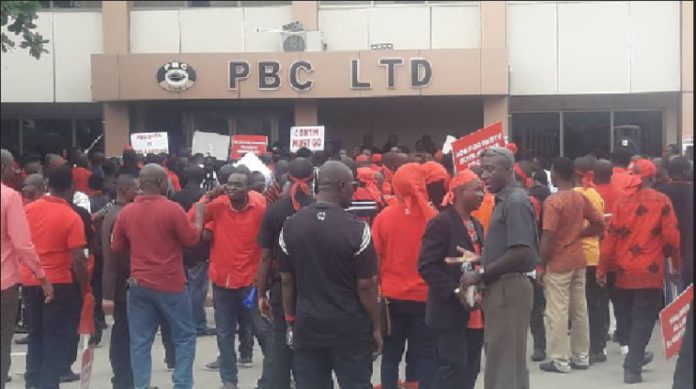
JoyNews’ investigations have revealed how the country’s biggest indigenous cocoa-buying company, PBC, risks a possible collapse following its steep decline in market share from 30.88 per cent to 8 per cent over the last five years.
In January last year, the management of the company hinted at downsizing its staff because it was unable to meet financial and operational obligations to its workers.
In August 2022, management issued a memo it was unable to pay salaries to staff. It’s now a tale of huge debts, fallen revenue, tonnes of cocoa beans stuck in the farms and produce clerks engaged in double trading to survive.
It’s now a tale of unpaid staff salaries, tonnes of cocoa beans stuck in the farms and produces clerks engaged in double trading to survive.
The entity used to control the biggest market share when it was incorporated as the Produce Buying Division Limited on November 13th, 1981 as a 100% state-owned enterprise and a subsidiary of the Cocobod.
But the light of the company that gave many a cocoa farmer some hope appears to have dimmed in recent times and things are on a nosedive.
District managers are unable to cart tonnes of cocoa from its societies to depots because of the lack of fuel to run its trucks.
Its purchasing clerks are now using PBC facilities to buy and trade cocoa for competitors because there are no funds to pay farmers who sell their beans to the producing buying company.
In 2021, a whistleblower and senior staff of the Produce Buying Company petitioned the presidency over the possible bankruptcy of the stated-owned venture. He raised alarm about the downward trend of PBC’s market shares.
In his petition to the president, he made a predication about the market share of the company. He stated that if PBC’s market share should hit a single digit, it will spell doom for the state-owned company.
He blamed management for the predicament of PBC and urged a change in business strategy to protect the livelihood of the over 900 staff and 15,000 commission-based clerks.
After blowing the whistle, he was suspended, demoted and eventually sacked for drawing the attention of the presidency to save the company and enable it to buy huge volumes of cocoa.
JoyNews visited three regions to engage with staff and purchasing clerks of PBC. A depot manager who pleaded anonymity over fears of victimization expressed concern over the dip in PBC market shares. He said this has impacted their operations in the regions, citing their inability to purchase cocoa for the main crop season in 2021.
According to him, the late release of funds last year to buy cocoa in week five of the season meant competitors had already made significant purchases.
He lamented that district managers have to contract personal loans before they’re able to cart cocoa from the societies to the depots.
A purchasing clerk who spoke to JoyNews said when PBC was not providing funds for the purchase of cocoa, compelled them to use their sheds and weighing scales to buy cocoa for competitors in order to maintain their customer base.
The state-owned company’s market share stood at 30.8 per cent, an indication the PBC was able to purchase 240, 297 tonnes of cocoa during the 2015/2016 main crop season. But, as at the close of 2021/2022 main crop season, the company’s market had dropped to 8 per cent because PBC was able to purchase only 52,364 for the season.
ALSO READ:
PBC Troubles: JoyNews explores factors accounting for steep decline in revenue
Akufo-Addo appoints Derek Kwaku Nkansah as PBC MD
The state ownership audited report of the finance ministry for the year 2020 indicated that PBC was among the government’s joint venture companies that had recorded a significant decline in its revenue from GH¢ 1.9 billion cedis in 2016 to GH¢1.0 billion cedis in 2020.
It represents 50 per cent revenue decline of PBC’s revenue over the four-year period. PBC is among government owned ventures that have been posting losses since 2016. As of 2020, PBC long-term loans stood at 504 million cedis. It’s now a tale of uncertainty for over 900 staff of PBC who have been battling irregular payment of salaries.
On August 2022, a circular copied all staff indicated that payment of salaries will delay due to the current financial challenge facing the company. When we spoke to this staff who pleaded anonymity in November 2022, he told JoyNews their salaries delayed for three months last year. It was not only difficult for many to fend for themselves, but, their families as well.
He said it is now difficult for staff to access welfare loans from the company which wasn’t the norm in the recent past.
So dire is the financial situation of PBC that it suspended the intake of national service personnel for the 2022/2023 year. In a circular cited by JoyNews, the human resource manager, William Ayisi, cited the current financial challenge of the company as the reason.
In January 2022, PBC wrote to the ministry of employment about its intention to restructure the company including downsizing its staff. It cited the prevailing financial and operational downturn making it difficult to pay staff and meet its obligations to its stakeholders. It said the staff who would be affected by the downsizing are those without establishment. Our sources suggest that when COCOBOD secured the cocoa syndicated loan last year, it loaned PBC with an estimated 350 million cedis. Management used 50 million cedis to cover staff remuneration and other administrative expenses. The national projection PBC set for itself for the 2022/2023 main crop season was to purchase 170,000 tonnes of cocoa. But, with the limited funds in PBC’s account, this target remains a pipedream, and leaves staff in another boat of uncertainty on what fate hangs on the survival of PBC and possible payment of their remuneration.
The fears of the staff of PBC keep growing with each passing day. The staff have the happenings of one of the subsidiaries of PBC, PBC Shea butter in Buipe in the Savannah region at the back of their minds.
PBC Shea butter has stopped operations, its offices abandoned and operational vehicles parked. Their fuel station and tanks are beginning to rust.
The once vibrant entity is a pale shadow of itself. The machines that used to process the shea butter are redundant and gathering dust with spiders filling its parts with cobwebs. The boilers which gave a sense of life at the premises are sitting in deafening silence.
Bags of shea butter wasting away in the company’s stores. Its storage facility are now the delight of birds. Atta Mudasiru, a staff of PBC shea butter, blames the lack of foresight on the part of management for the plight of the company.
Since then, it’s been untold hardship on the staff of the company. It’s been eight months since they were paid. Musah Mohammed says he is heavily indebted, making it difficult for him to step out during day time.
The management is unable to raise loans from the banks because of PBC’s indebtedness. Borenyi Yusif cannot remember the last time he set his eyes on top managers of the company.
This is a fate not far from PBC limited, as many workers fear. It requires immediate intervention to save the only state-owned cocoa buying company for the sake of the many mouths that depend on its survival.




